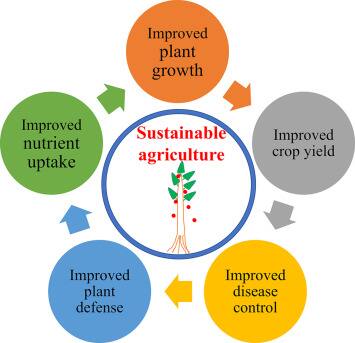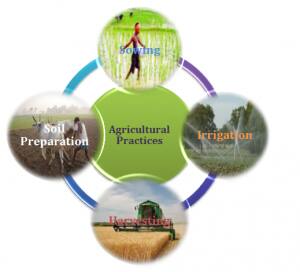Agriculture Agricultural Practices: Overview, Organic Farming, Irrigation
Agricultural practices are the only reason why there is high production of crops and we can meet the demand of the population. Due to good agricultural practice, there is also good quality of crops produced. Agriculture practices are one of the important parts of Strategies for Enhancement in the food production chapter of biology class 12th.
NEET 2025: Mock Test Series | Syllabus | High Scoring Topics | PYQs
NEET Important PYQ's Subject wise: Physics | Chemistry | Biology
New: Meet Careers360 B.Tech/NEET Experts in your City | Book your Seat now
- What are Agricultural Practices?
- Major Agricultural Practices
- Most Common Agricultural Practices
- Importance of Sustainable Agricultural Practice
- Tips, Tricks, and Strategies for Agricultural Practices
- Types of Questions Asked from Agricultural Practices
What are Agricultural Practices?
The techniques and tactics that farmers use to cultivate crops and produce livestock are known as agricultural practices. Depending upon the resources available, soil types, and the environment, these techniques vary. Some of the major importance of agriculture practices are discussed below:
Agriculture practices techniques like crop rotation and organic fertilizers increase the fertility as well as nutrients of the soil.
Techniques like soil preparation, use of green manure and organic farming increase productivity and also conserve minerals at the same time.
For better agriculture practices there are also best management and timely crop rotation techniques available which help you control the pests, weeds and your crops from several diseases.
Some modern methods like drip irrigation and conservation tillage can also help in providing sufficient water and reduce the environmental damage which is done due to normal agricultural methods.
Proper agriculture techniques help in maintaining the environmental balance and reduce the ecological footprint in the maintenance of biodiversity.
Also Read
Major Agricultural Practices
Soil Preparation
Crop cultivation begins with the preparation of the soil. The soil must be ploughed evenly and levelled. A good agricultural fertilizer should be used in order to enrich with nutrients.
Sowing
Selection of Superior seeds is sown for better production of crops. Drilling and broadcasting are some of the agriculture techniques that help increase the production of your crop and these are used very commonly.
Irrigation
Crop growth requires appropriate water management. Techniques like drip irrigation and sprinkler irrigation ensure appropriate soil moisture while preserving water. Crop must have and water availability impact irrigation techniques.
Weeding
Removing unwanted plants that compete with crops for sunlight and nourishment needs weeding. Chemical and mechanical techniques are used to get rid of weeds.
Protection of crops
Herbicides and pesticides are put to use by farmers to protect their crops from diseases and pests. However, overuse of chemicals can harm aquatic ecosystems by leading to eutrophication, and contamination of nutrients in water bodies.
Harvesting
Once the crop is ready the process of harvesting begins. The grains are collected and the residue is used for the generation of biofuel.
Storage
Once the crops are harvested and collected they need to be stored at safe temperatures and environment for long periods of time. This process is also for the protection of crops from pests and rodents.
Most Common Agricultural Practices
Some of the common agricultural practices are discussed below:
Types of Agriculture Practices | Explanation |
Shifting agriculture |
|
Intensive farming |
|
Plantation agriculture |
|
Mixed farming |
|
Importance of Sustainable Agricultural Practice
A sustainable agriculture practice is a balance towards good food production with the preservation of the environment and ecosystem at the same time. By adopting good agriculture practices methods you can save the soil from problems like soil degradation, water scarcity and excessive use of chemical fertilizers.
Apart from this a sustainable and organic agriculture Practice also helps in promoting the balance between biodiversity by maintaining crop rotation and natural ecosystems. It also saves aquatic ecosystems from the harmful chemicals which are used in pesticides and fertilizers.

Tips, Tricks, and Strategies for Agricultural Practices
It takes effort to remember everything in a single go. We made the entire problem easy. Some of the tricks regarding Agricultural Practices are given below which you can use to memorise the important points.
Getting the Soil Ready "PAL: Plowing, Aeration, Leveling"
P: Plowing, which digs up the soil in preparation for planting
A: Aeration, which allows nutrients and air to reach roots
L: Leveling ( soil leveling for better irrigation)
Methods of Sowing
"BDS: Broadcasting, Drilling, Sowing Depth"
B: Broadcasting (that is, the seeds over a broad region)
D: Drilling, which includes planting seeds at specific depths
S: Planting seeds at the right level for germination is known as "sowing depth."
Methods of Irrigation "SDF: Sprinkler, Drip, Flood"
S: Sprinkler (rain-like spraying of water on crops)
D: Drip (to save water, water goes straight to the roots)
F: Flood (also known as the traditional method of pouring water onto fields)
Types of Questions Asked from Agricultural Practices
During exam preparation, different types of questions about Agricultural Practices are asked. The table below contains the different patterns of questions asked in different exams.
Exam Type | Types of Questions Asked | Weightage |
| 2% | |
| 3% | |
Paramedical |
| 4% |
Also Read
Frequently Asked Questions (FAQs)
Agriculture is classified into four types: shifting cultivation, subsistence farming, pastoralism, and intensive farming. Agriculture, despite its variable nature, is the most widespread activity.
Agriculture is a late Middle English adaptation of Latin agricultura, derived from ager 'field' and cultra 'cultivation' or 'growing'. While agriculture is typically associated with human activities, certain ant, termite, and beetle species have been cultivating crops for up to 60 million years.
Norman Ernest Borlaug (March 25, 1914 – September 12, 2009) was a humanitarian and agricultural scientist from the United States. Some consider him the "Father of Modern Agriculture" and the Green Revolution.
Soil preparation, sowing, manure and fertiliser addition, irrigation, harvesting, and storage are the main steps in agricultural practices.
Agriculture has a wide range of effects on society, including supporting livelihoods through food, habitat, and employment; providing raw materials for food and other products; and fostering strong economies through trade. The Balance Small Business is the source.
Also Read
21 Nov'24 10:32 AM
12 Nov'24 05:14 PM
09 Nov'24 02:52 PM
06 Nov'24 04:48 PM
06 Nov'24 12:30 PM
05 Nov'24 08:12 PM
24 Jul'24 07:18 PM
